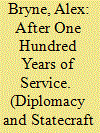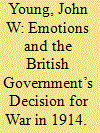|
|
|
Sort Order |
|
|
|
Items / Page
|
|
|
|
|
|
|
| Srl | Item |
| 1 |
ID:
163692


|
|
|
|
|
| Summary/Abstract |
In 1923, the United States celebrated the centennial anniversary of the Monroe Doctrine. Overlooked by historians, the centennial served as more than an isolated moment of memorialisation; this analysis investigates the ways in which it shaped and reflected domestic perceptions of the place of the United States in the world during the early 1920s. The various celebratory events that took place across the nation re-enforced the discordant nature of United States national security by emphasising and exacerbating the doctrine’s disputed meaning. By providing a forum in which it could be scrutinised, the centennial emphasised the policy’s fractured meaning and demonstrated that both regional hegemony in the Western Hemisphere and Pan-Americanism were perceived as core values of United States national security that emanated from the doctrine’s enunciation in 1823.
|
|
|
|
|
|
|
|
|
|
|
|
|
|
|
|
| 2 |
ID:
163695


|
|
|
|
|
| Summary/Abstract |
This analysis of British Ostpolitik focuses on Margaret Thatcher’s diplomacy, exploring her quietly pragmatic efforts to bring about a gradual transformation of Eastern Europe at the cost of supporting selected communist regimes. The analysis reveals how a market-oriented economic experiment in Budapest first sparked the prime minister’s interest in Hungary and inspired her foreign policy in Eastern Europe. It documents the British search for a socialist transition ‘model’, which led to unprecedented diplomatic overtures towards a small enemy state on the brink of bankruptcy. Based on extensive archival research in Budapest and London, as well as on the personal recollections of three senior British diplomats, this case study challenges some of the common assumptions of the historical literature about Thatcher’s chosen method of combating communism and Britain’s long-term strategy towards the Eastern bloc.
|
|
|
|
|
|
|
|
|
|
|
|
|
|
|
|
| 3 |
ID:
163691


|
|
|
|
|
| Summary/Abstract |
Recent years have witnessed increasing interest amongst international historians in the impact of emotions on foreign policy decisions as part of a broader movement usually known as the ‘emotional turn’. This trend is associated with findings from the field of neuroscience that cognition and emotion—rather than operating independently—remain inextricably bound together in human decision-making. Most work thus far has concentrated on American foreign policy since 1945, but this analysis broadens the focus to consider the impact of emotions on British decision-makers, especially Cabinet ministers, as they debated whether to go to war in 1914. It shows that despite a tendency by the protagonists themselves to interpret their actions in rational terms, sufficient evidence of emotions exist in the written record to allow a fresh approach to the July Crisis. Whilst emotions must be seen as acting alongside rational mental processes, rather than regularly over-powering them, a focus on the subject helps explain different approaches taken by individual ministers, why the majority came to approve intervention in the conflict, and how Prime Minister Herbert Asquith, partly by appearing to control his feelings, minimised resignations over the fateful decision. It also allows a new view about why the Cabinet decided to go to war on 4 August in defence of Belgium, despite deciding just a few days earlier that the question of fulfilling the 1839 guarantee of Belgian neutrality was ‘one of policy than of legal obligation’.
|
|
|
|
|
|
|
|
|
|
|
|
|
|
|
|
| 4 |
ID:
163694


|
|
|
|
|
| Summary/Abstract |
Between 1961 and 1972, Latin America came to capture India’s diplomatic imagination. Officials within India’s Ministry of External Affairs identified strengthened ties with the region as a way to augment, restrain, and transcend the Non-Aligned Movement, further India’s international prestige and political influence, spread Indian culture, and bolster India’s economy. India’s interest in Latin America climaxed after Prime Minister Indira Gandhi prioritised the region and Pakistan strengthened diplomatic relations with Panama in autmn 1967. Yet uncertainty over the internal realities of Latin America hindered any Indian pivot. In the end, India’s aspirations for Latin America failed to materialise.
|
|
|
|
|
|
|
|
|
|
|
|
|
|
|
|
| 5 |
ID:
163693


|
|
|
|
|
| Summary/Abstract |
This analysis examines the influence of the United States government on the internal conflict within the Armenian Apostolic Church and the transnational Armenian community between 1956 and 1963. During these years, American officials followed closely and occasionally intervened in this strife amongst various Armenian political parties and factions within the church. The intervention helped to shape the outcome of the struggle within the Church and within the broader Armenian community.
|
|
|
|
|
|
|
|
|
|
|
|
|
|
|
|
| 6 |
ID:
163697


|
|
|
|
|
| Summary/Abstract |
From 1986 to 1991, the United States Central Intelligence Agency funnelled arms to the National Union for the Total Independence of Angola through Zaire’s Kamina Airbase. Recently declassified documents cast new light on the ways that facilitating this operation and protecting its covert status provided invaluable bargaining leverage for Zaire’s president, Mobutu Sese Seko, who demanded political and economic concessions from Washington. As a rare Cold War precedent for the types of covert, temporary basing agreements that the United States is now establishing throughout Africa, the Kamina case thus warrants a substantive reappraisal.
|
|
|
|
|
|
|
|
|
|
|
|
|
|
|
|
| 7 |
ID:
163698


|
|
|
|
|
| Summary/Abstract |
Non-governmental organisations [NGOs] sought to expand American conceptions of human rights and contributed to shaping the American debate over Nicaragua policy in the 1980s. Progressive NGOs interpreted human rights to include political and civil liberties along with social and economic ones, an interpretation similar to that of the Nicaraguan government and embodied in Nicaraguan democracy. The Ronald Reagan Administration interpreted human rights narrowly to include only political and civil ones whilst recognising electoral politics as the essential ingredient of democracy. The Administration also considered the defeat of communism as its highest priority. Calling the Sandinistas, which controlled the Nicaraguan government after July 1979, both communist and allies of the Soviets and Cubans, Reagan’s anti-communism led him to support a counterrevolutionary force in Nicaragua—the Contras. NGOs and members of Congress regularly accused the Contras of human rights abuse; and NGOs used a lexicon of human rights to oppose Reagan’s Nicaragua policy and challenge the Cold War construct.
|
|
|
|
|
|
|
|
|
|
|
|
|
|
|
|
| 8 |
ID:
163696


|
|
|
|
|
| Summary/Abstract |
The State Department played a leading role in the struggle within the United States government to define and implement America’s foreign drug policy throughout the late twentieth century. After their participation in 1969’s Operation Intercept illustrated the central importance of Mexican national sovereignty in bilateral relations, United States diplomats worked to institutionalise an aversion to unilateral American action on drug issues south of the Rio Grande. Over time, both the co-operative framework cultivated between American and Mexican officials throughout 1970s and an especially turbulent chapter in bilateral relations during the 1980s helped to establish further the State Department’s highly conciliatory approach to drug diplomacy that today remains a defining characteristic of joint Mexican–American efforts to combat the production and traffic of illicit drugs.
|
|
|
|
|
|
|
|
|
|
|
|
|
|
|
|
|
|
|
|
|